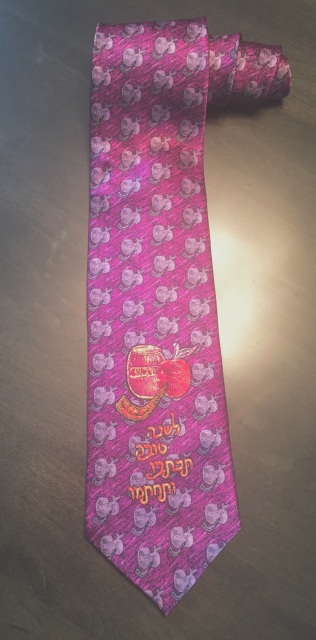- Ties (Neckwear)
- >
- Rosh Hashana - Jewish New Year - Purple Silk Tie Apples & Honey
SKU:
Rosh Hashana - Jewish New Year - Purple Silk Tie Apples & Honey
$36.00
$25.00
$25.00
On Sale
Unavailable
per item
The design features a container of honey with apples and the words "for a sweet New Year shall you be written".
Rosh Hashanah, which literally means the head of the year, commemorates the anniversary of the creation of the world. It is celebrated on the first and second days of the seventh Hebrew month, Tishri. Tradition tells us that God completed the seven days of Creation on Rosh Ha-Shanah. The first two days of Tishri were not called Rosh Hashanah until Talmudic times. Jewish leaders of the day m ay have been reluctant to promote large celebrations around a fall new year because moon festivals were common among pagan religions. Many Near Eastern religions, for example, celebrated divine coronation festivals in the Fall. By the fourth century, B.C.E., when the Jews returned from Babylonian exile to build the second temple, Rosh Hashanah was well established. By the time of the Mishnah, the codification of Jewish oral tradition, Rosh Hashanah had developed a more serious tone. Now, having suffered the loss of the second temple, Rosh Hashanah emphasized the anniversary of creation, and of G-d as judge, dispensing mercy or justice to those who do or do not repent their sins. The holiday has several names and meanings. In the Bible it is referred to as Yom Teruah, the Day of Sounding the Shofar, (Numbers 29:1).The blowing of the Shofar is the only specific commandment for Rosh Hashanah.. In Biblical times the shofar, which is made from Rams horn, was blown to announce an important event, such as the alarm of war or the coming of peace. The shofar was sounded during the giving of the Ten Commandments to Moses at Mount Sinai. It is an appropriate symbol as it reminds Jews everywhere of the willingness of Abraham to sacrifice his son, Isaac, to fulfill G-ds command. At the last moment G-d ordered Abraham to exchange Isaac with a sacrificial lamb. The rams horn is blown 100 times. Yom Ha-Zikaron, a "Day of Remembering," a time to review the past year, considering both the good we have done and the times when we did not measure up. It is also Yom Ha-Din, the "Day of Judgment." The Jewish tradition holds that we are evenly balanced: part good and part sinful. Therefore one righteous act can tip the scales in our favor, and we can be inscribed in the Book of Life. To indicate the hope for a sweet year, new fruits are added to the holiday table. These fruits may include any fruit that you have not yet eaten this year, however, customary special fruit additions are: pomegranates, and persimmons. It is also customary to dip apples and/or a piece of challah in a dish of honey to insure sweetness in the coming year.



